 The big Jubilee conference in Pittsburgh is over (except for putting away all the unsold books – thousands and thousands. Yikes!) We thank you for your prayers and encouragement; we were stressed and aching from all the mental work of curating the selections and from the physical labor of lugging the boxes and in the middle of the chaos of setting up last Thursday and Friday we almost wanted to walk away and give up. Our staff back at the store worked really hard getting us there and our CCO friends out in Pittsburgh are so supportive, and a number of good folks volunteered yet again this year. (Chris Carson and his Jubby team are always so good directing this big gig geared to college students. some of our boxes and a list of categories
The big Jubilee conference in Pittsburgh is over (except for putting away all the unsold books – thousands and thousands. Yikes!) We thank you for your prayers and encouragement; we were stressed and aching from all the mental work of curating the selections and from the physical labor of lugging the boxes and in the middle of the chaos of setting up last Thursday and Friday we almost wanted to walk away and give up. Our staff back at the store worked really hard getting us there and our CCO friends out in Pittsburgh are so supportive, and a number of good folks volunteered yet again this year. (Chris Carson and his Jubby team are always so good directing this big gig geared to college students. some of our boxes and a list of categories
What an incredible event they create! Here is a short, energetic “highlights” video which will give you a little glimpse.) By Friday late afternoon the students and others started to show and it was glorious. That I got to preach on Sunday morning besides my more customary book announcements (10 books in 7 minutes!) made this 40th anniversary Jubilee really meaningful for us.
To think of all those books that we sold being read by students and their friends (the conference attracts young professionals, college profs, church leaders and older fans) should bring you great hope.
I do plenty of hand-wringing about the decline of reading in American culture, and even at Jubilee, standing in front of some of the very best titles I’ve ever seen, on topics where Christian books are hard to find, still some people still don’t take us up on the offer to buy. Tolle Legge? Not so much, I’m afraid. And there’s lots of picture-taking of titles, probably so they can buy them from the faceless porno dealers over at Amazon. Sigh; it is so discouraging and feels unfair. Even now, in the triumph of a great event, and with lots of great books now in the hands of eager readers and rising leaders — just think of the ripple effect of that, the maturity and blessing and impact of the righteous ideas found in those books being circulated and promoted and discussed and incarnated – -we realize that it is possible that our bookstore work may have peaked, so to speak. Fewer people buy books these days, fewer people have learned the habit of browsing bookstores (and there are fewer quality Christian bookstores, at least, in which to seriously browse.) But as Jubilee wonderfully illustrates, there are a lot of great speakers and teachers, and lot of folks interested in good stuff, and plenty of quality books being published. Reading and talking about books together as a component of Christian learning and growth is not what it once was, it seems to me, but we’re proud of what CCO does and honored to be a part of their good efforts.
So, at least in Pittsburgh again this year, we’ve seen God work, the Spirit wooing folks to a richer, deeper, more thoughtfully engaged faith, with books seen as helpful tools for on-going discipleship. We are encouraged, even if aware of the daunting task of deepening the worldview and sense of vocation of a rising generation of serious Christians. Will you join me in saying a prayer for those who bought books, that those books would be read, that each author’s insights would hit its mark, that the act of reading would stimulate and inspire and provoke so that Christ’s Kingdom would be advanced, that young readers would become fruitful leaders even in these hard times, for God’s glory and the common good. Pray for the CCO staff and other campus workers who brought students to Jubilee to learn about this “all of life redeemed” hopeful vision of a good, fallen, but restored creation, this worldview that believes God is “transforming everything.” May that event, and the books they cart home, stimulate big hope.
And I invite you to re-double your efforts here in the fast-paced digital age to deepen your book buying and book reading habits. Start a book club if you don’t already have one. Even a pair of serious readers can help one another grapple with significant work, and learn more about faith, about discipleship, about our culture, and about God’s mission in the world. From novels to theology, media studies to spirituality, Bible commentaries to ruminations on work and vocation, there are so many resources that call out to be studied together, whose benefits are gleaned best when not read solo. Get a friend, grab a beverage, turn some pages. Jubilee kids are going to be doing it this next month, we trust. Why don’t you?
Below I list a few brand new ones that we could recommend for some healthy book club reading. Or maybe after hearing about the high-energy, all-of-life-redeemed Jubilee vision you might want to take 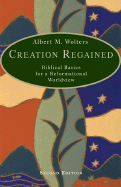
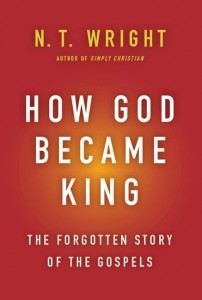 up conference classics like Al Wolter’s Creation Regained: The Biblical Basis for a Reformational Worldview or The Call: Finding and Fulfilling Your Life’s Purpose by Os Guinness, Truth Is Stranger Than It Used to Be: Biblical Faith in a Postmodern Age (the provocative sequel to an older Jubilee classic, Transforming Vision by Brian Walsh & Richard Middleton) or our Book of the Year a year or so ago, Visions of Vocation: Common Grace for the Common Good by former Jubilee conference director Steve Garber. Or try something by N.T. Wright, such as his accessible Simply Good News or
up conference classics like Al Wolter’s Creation Regained: The Biblical Basis for a Reformational Worldview or The Call: Finding and Fulfilling Your Life’s Purpose by Os Guinness, Truth Is Stranger Than It Used to Be: Biblical Faith in a Postmodern Age (the provocative sequel to an older Jubilee classic, Transforming Vision by Brian Walsh & Richard Middleton) or our Book of the Year a year or so ago, Visions of Vocation: Common Grace for the Common Good by former Jubilee conference director Steve Garber. Or try something by N.T. Wright, such as his accessible Simply Good News or 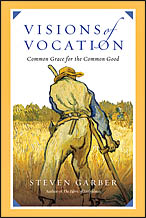
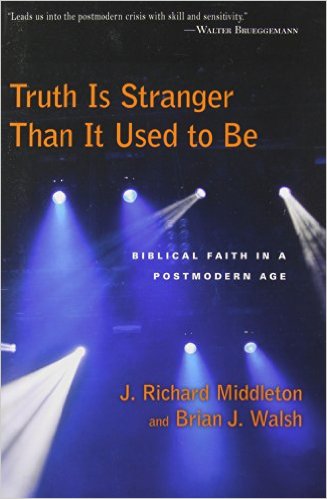 the very important How God Became King or one of his most popular, if a bit tedious at times, Surprised by Hope: Rethinking Heaven, the Resurrection, and the Mission of the Church. (Each of these were mentioned at Jubilee, by the way, by me or by a workshop leader or two.)
the very important How God Became King or one of his most popular, if a bit tedious at times, Surprised by Hope: Rethinking Heaven, the Resurrection, and the Mission of the Church. (Each of these were mentioned at Jubilee, by the way, by me or by a workshop leader or two.)
Or, if you want a very brief booklet that will knock your socks off, why not order A New Heavens and a New Earth: BIblical Picture of Hope by N.T. Wright? It’s an inexpensive booklet we order from England because it makes the case for God’s renewal of all things and the new creation vision that we are 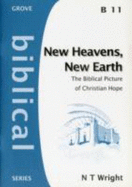
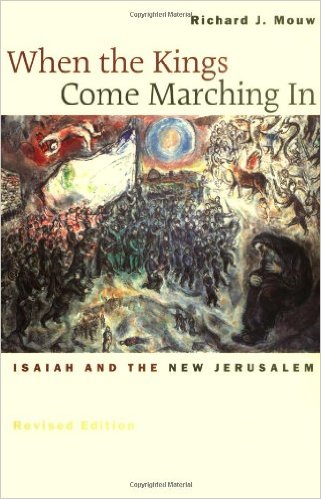 convinced is transformational once folks grasp it.
convinced is transformational once folks grasp it.
Or, try this, one of my all time favorite Biblical studies books — it used to be used among CCO staff in their own training years ago to help them get this radical, Biblical vision of God’s promise and deliverance, Christ’s Kingdom coming on Earth into their bones. Richard Mouw’s little When the Kings Come Marching In: Isaiah and the New Jerusalem is a short volume published by Eerdmans that unpacks this notion that the new creation will be physical, and therefore cultural, and therefore our own efforts for social and cultural restoration and healing are valuable and honored by God. Some of our work now may make it into eternity! He draws on a significant chapter in Isaiah and shows how this points us to creation regained in the new City. What a book! We’ve had folks buy it from us and come back all hopped up, wondering (a) why they’ve never been taught this before in their otherwise Bible believing churches and (b) what next?
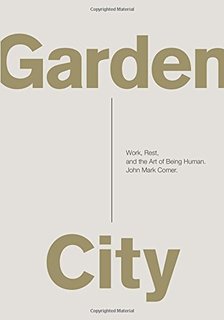 For someone wanting to enjoy a delightful, upbeat and utterly engaging read on some of these themes, join the many Jubilee-attendees who bought Garden City: Work, Rest, and the Art of Being Human by John Mark Comer. It’s a fun one, conversational and, yet, for those wanting a light intro to this wholistic Kingdom vision, it could be truly life-changing. I featured it at the adult pre-conference called Jubilee Professional and up front the first night of the main conference. Garden City – yes!
For someone wanting to enjoy a delightful, upbeat and utterly engaging read on some of these themes, join the many Jubilee-attendees who bought Garden City: Work, Rest, and the Art of Being Human by John Mark Comer. It’s a fun one, conversational and, yet, for those wanting a light intro to this wholistic Kingdom vision, it could be truly life-changing. I featured it at the adult pre-conference called Jubilee Professional and up front the first night of the main conference. Garden City – yes!
I can’t tell you how exciting it is when we hear of book groups or Sunday school classes or campus fellowship groups or church leadership teams who read one of these books together and realize that the implications are significant and nearly endless, that there is some re-thinking to do, that we live in a time which calls for repentance and refreshing for authentic, fruitful, missional living. It happens, you know – church leaders catch a fresh vision around these very things and realize that church-as-usual will no longer do.
To explore this very matter in the local church I sometimes suggest Work Matters: Connecting Sunday Worship to Monday Work by Rev. Tom Nelson for telling the story of his own church and congregants (he doesn’t call them “laypeople” as he rejects the clergy/laity dualism) took up visions of vocation, and increasingly focused on the work world and careers of the people as the primary locus of God’s work 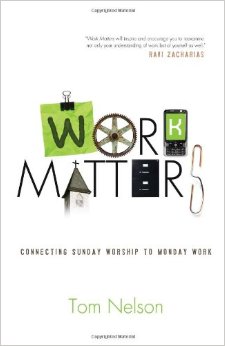
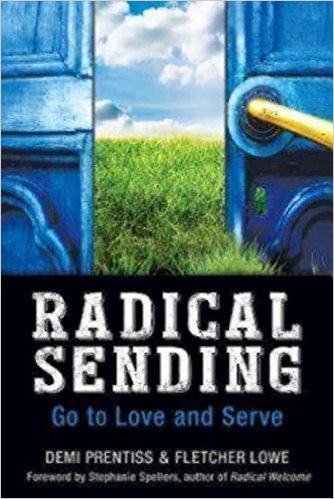 and their ministry. Tom and some of his congregants have been to Jubilee in past years, by the way. Or, recall my review a month or so ago of Radical Sending: Go To Love and Serve by Demi Prentiss & J. Fletcher Lowe, two Episcopalian authors who invite mainline parishes to think about work, calling, vocation, the missio dei, and how congregations can facilitate ordinary folks serving God in their work-a-day lives. As the conference slogan declared a few years ago, “this changes everything!”
and their ministry. Tom and some of his congregants have been to Jubilee in past years, by the way. Or, recall my review a month or so ago of Radical Sending: Go To Love and Serve by Demi Prentiss & J. Fletcher Lowe, two Episcopalian authors who invite mainline parishes to think about work, calling, vocation, the missio dei, and how congregations can facilitate ordinary folks serving God in their work-a-day lives. As the conference slogan declared a few years ago, “this changes everything!”
From the most progressive mainline churches or advocacy groups to the most orthodox Gospel Coalition folk, from the most edgy emergent communities to the most conventional traditional congregations, from large and spiffy neo-mega-churches to small, old fashioned, rural “wee kirks” we are convinced that these kinds of books are foundational, vital, urgent, offering a framework and vocabulary to help folks live out their faith in our time with integrity and purpose.
Okay, I’m jazzed up about all those books we sold to the CCO folks and what might happen if even half of these eager young Christians take them seriously. And I’m nervous about what happens if they don’t. I know church renewal and cultural restoration is God’s final work and that we on our own simply cannot improve our world very much, and we certainly don’t “redeem” anything. Order Os Guinness’ recent Renaissance: The Power of the Gospel However Dark the Times if you struggle with this – it is a rich reminder of first things, of trusting God, of being faithful in little things even as we hope big hopes. And, also, perhaps in tension with that wonderful resource, I’d highly recommend reading with another a book to which I alluded in my Sunday morning talk at Jubilee: Prophetic Lament: A Call for Justice in Troubled Times by Sun-Chung Ra. It is both an astute and anguished cry of the heart about the injustices in our land, and a fairly serious study of the book of Lamentations. I don’t know if you can sell that one on your people -” Hey, wanna get together and study a book of the Bible you maybe have never heard of, let alone read?”–but it’s worth a try. It’s a great book, the first of a series where the books will be an interesting blend of Bible commentary and cultural engagement.
So, yes, both the hopeful, astute Renaissance and the sad, gripping Prophetic Lament remind us that even with our efforts to help others learn, even with all the books we sell and learn form, even with all the great events like Jubilee, we need God. We. Need. God.
But books can help push us in the right direction, right? Yes!
So — to the new list.

This brand new one – oh how I wished it had come a week earlier so we could have featured it at Jubilee! – is small, fun, a really fine reflection equipping us to be more creative, more innovative, learning the ability to “adapt and innovate and to inspire the same in others.”
It seems to me that Create vs Copy might appeal to those who like the high-energy, punchy, passionate brevity of writers like Seth Godin or start-up gurus like Guy Kawasaki or life coaches like Martha Beck or Pamela Slim. Wytsma cites educators such as Sir Ken Robinson and explores the science of creativity by drawing on the likes of Daniel Pink and Robert Epstein. (And, though-out, he comes back to C.S. Lewis and G.K. Chesterton, over and over.) This is a rich, interesting, energetic little book and I’m excited about it. Bob Goff writes that it is “a terrific book on the power of imagination to shape our lives, world, and faith – by one of the most creative guys I know.” And if Goff says Wytsma is creative, well, Wystsma must be creative. And this book will help you, in your personal comings-and-goings, I’m sure, but also if you are in conflict at work, in the doldrums at church, or needing to rediscover why you do what you do and just do it better.
If you read this, and I hope many do, here is a thing to wonder about: what if we were to back up and ask what cultural and philosophical baggage the very notion of creativity brings with it, and ask if those a priori assumptions are themselves consistent with a Biblical worldview? Calvin Seerveld, the premier scholar of a Christian perspective on aesthetics, might have something to say on this topic (see my lengthy piece about him and his work here) and I wished Wytsma dug a little deeper on this seminal matter. Still, it’s surely a great little book, designed wonderfully, with good discussion questions at the end of each chapter. It really looks fun, and others like Claire Diaz-Ortiz, a Silicon Valley innovator herself, says Create vs Copy is the gold standard for inspiring leaders to make their mark.”
My friend C. Christopher Smith (author of Slow Church and a person I trust much) says “Create vs. Copy will electrify our imaginations as it challenges us to new, redemptive ways of seeing and steers us toward the flourishing God intends for the world.” The ever-brilliant Aussie cultural critic Mark Sayers declares that “Create vs Copy is an essential resource for anyone engaged in partnering with God as He re-creates the world.”
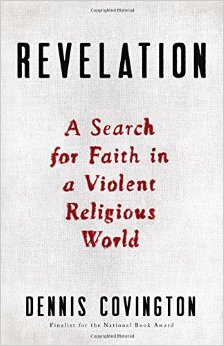 Revelation: A Search for Faith in a Violent Religious World Dennis Covington (Little Brown) $26.00 It is a good day around here when we get books by authors we admire and whose writing we are just mad about. It is a great year when Dennis Covington releases a new book. You may know his stunning memoir called Salvation on Sand Mountain which explored his reporting on and then involvement with a snake-handling church in Appalachia, or his eloquent, profound book co-written by his wife at the time, the extraordinary essayist Vickie Covington, called Cleaving, about their good but troubled marriage. I loved his wild ride of a nutty book about trying to re-claim Florida land his dad had been bilked out of called Red-neck Rivera which below the surface (not unlike the more intense and beautiful Sand Mountain) seemed to indicate his nearly pathological draw to dangerous stuff. To say his book writing is “high octane” puts it mildly. And, once again, in this new one, it seems that he is drawn to danger.
Revelation: A Search for Faith in a Violent Religious World Dennis Covington (Little Brown) $26.00 It is a good day around here when we get books by authors we admire and whose writing we are just mad about. It is a great year when Dennis Covington releases a new book. You may know his stunning memoir called Salvation on Sand Mountain which explored his reporting on and then involvement with a snake-handling church in Appalachia, or his eloquent, profound book co-written by his wife at the time, the extraordinary essayist Vickie Covington, called Cleaving, about their good but troubled marriage. I loved his wild ride of a nutty book about trying to re-claim Florida land his dad had been bilked out of called Red-neck Rivera which below the surface (not unlike the more intense and beautiful Sand Mountain) seemed to indicate his nearly pathological draw to dangerous stuff. To say his book writing is “high octane” puts it mildly. And, once again, in this new one, it seems that he is drawn to danger.
I got home from Jubilee bleary-eyed, exhausted, with a belly full of bad road-trip coffee and ears still buzzing from the sound system, and just wanting to go to bed. We unloaded some stuff back into the store, my eyes fell on this book on our new release table, and I felt like it was one of those moments: the new Dennis Covington book! If I start this now I will be up all night – should I even touch it? Read the first pages? Covington is an “astonishing” writer and here he is apparently raising huge questions of doubt and faith and of the role of toxic, even violent, religion. Another high-octane, truly astonishing writer, Mark Richard, author of the unforgettable House of Prayer No. 2I, says, “Dennis Covington empathically inhabits the victims of the violence he meets, and in a fleeting instance find the grace that sustains them and the despair that transcends them beyond our reckoning. Touched by his epistles, we are somehow encouraged, even when all we have is God.”
Kim Barnes (another of my favorite writers, another of the most unforgettable memoirists I’ve ever read) says “From the first sentence on, you understand what Dennis Covington brings to the page is something raw, terrifying, brilliant, and necessary. Vivid, tense, and compelling, Covington’s story bears brave and unflinching witness to one of the most threatening conflicts of our time.”
I’m telling you, the blurbs on the back of this book themselves might keep you up at night. Listen to Alan Weisman, who writes,
Once again, Dennis Covington, author of the astonishing Salvation on Sand Mountain, rushes headlong into abysses that the rest of us flee, from the most brutal spots on earth to the rawest truths in the mirror. His obsessed, haunted question scours the depths of madness — his, ours, this century’s — yet somehow salvages faith from the most fearful despair. This brave book is a Revelation, indeed.
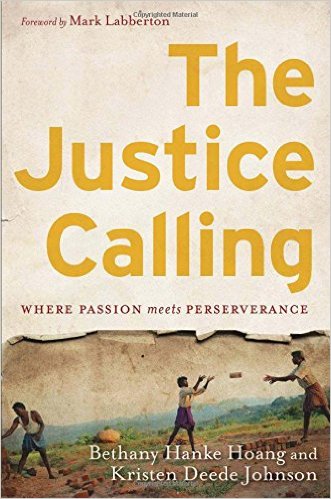 The Justice Calling: Where Passion Meets Perseverance Bethany Hanke Hoang & Kristen Deede Johnson (Brazos) $19.99 What a thrill to help launch this brand new, very handsome hardback book at #Jubilee2016. Bethany has been to Jubilee before and her role this year as a workshop leader was exceedingly important – she basically did a serious-minded Bible study, explaining the Biblical and theological foundation for working for social change. Her MDiv is from Princeton and she continues to work with the premier anti-trafficking organization, IJM (International Justice Mission) where she directs the Institute for Biblical Justice. Her vibrant co-author is associate professor of theology and Christian formation at Western Theological Seminary in Holland Michigan. While a prof at the nearby Hope College (a Reformed Church in America college) she helped create a program dedicated to upholding the significance of theological formation, spiritual growth, cultural engagement, and vocational discernment. Which is to say both women are exceptionally well-schooled and committed to educating for lasting, formational transformation in learners so that they might be the kind of people who are empowered to be healthy activists in church and world. They understand the big flow of the Scriptures, the story, as we say, and place God’s relentless call to do justice in that context. Andy Crouch has called it “a deep, wide, wise contribution to a truly comprehensive Christian understanding of Justice” and says, “I can’t imagine a better biblical and theological introduction to the topic of justice.”
The Justice Calling: Where Passion Meets Perseverance Bethany Hanke Hoang & Kristen Deede Johnson (Brazos) $19.99 What a thrill to help launch this brand new, very handsome hardback book at #Jubilee2016. Bethany has been to Jubilee before and her role this year as a workshop leader was exceedingly important – she basically did a serious-minded Bible study, explaining the Biblical and theological foundation for working for social change. Her MDiv is from Princeton and she continues to work with the premier anti-trafficking organization, IJM (International Justice Mission) where she directs the Institute for Biblical Justice. Her vibrant co-author is associate professor of theology and Christian formation at Western Theological Seminary in Holland Michigan. While a prof at the nearby Hope College (a Reformed Church in America college) she helped create a program dedicated to upholding the significance of theological formation, spiritual growth, cultural engagement, and vocational discernment. Which is to say both women are exceptionally well-schooled and committed to educating for lasting, formational transformation in learners so that they might be the kind of people who are empowered to be healthy activists in church and world. They understand the big flow of the Scriptures, the story, as we say, and place God’s relentless call to do justice in that context. Andy Crouch has called it “a deep, wide, wise contribution to a truly comprehensive Christian understanding of Justice” and says, “I can’t imagine a better biblical and theological introduction to the topic of justice.”
The chapter titles of this new book illustrate the artful way it is written and the profound way it develops. The footnotes are extraordinarily interesting; there are nice pull quotes throughout making this quite useful. (If only there were discussion questions at the end of each chapter – I assure you, though, that there is so much stimulating information in these pages that your group would have plenty to talk about!) This really is a fabulous new book and we can’t recommend it more heartily.
Contents
Introduction: Justice and God
1. Engage the Whole Story
Justice and Righteousness
2. Receive God’s Vision of Flourishing
Justice and Creation
3. Move toward Darkness
Justice and the Fall
4. Lament
Justice and Israel
5. Live as Saints (Not Heroes)
Justice and Jesus
6. Be Sanctified and Sent
Justice and the Church
7. Persevere in Hope
Justice and All Things Becoming New
Conclusion: Abide in Jesus
Justice and Perseverance
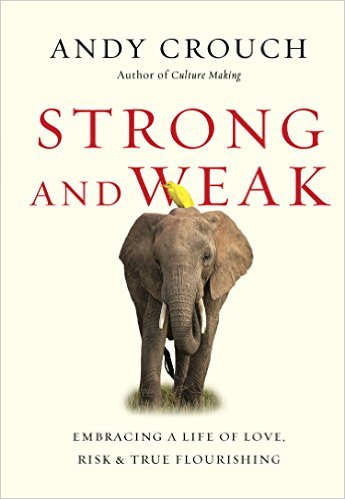 Strong and Weak: Embracing a Life Full of Love, Risk, and True Flourishing (Andy Crouch) $20.00 We have announced this previously, inviting people to pre-order it from us, and we are thrilled to report that the book has shipped out to stores and that we had it at Jubilee – right from the printing press to the convention center in Pittsburgh. Andy has been very supportive of Jubilee over the years and although he wasn’t there this year, Strong and Weak was almost the top seller there. (We sold more of Good Faith by Gabe Lyon and David Kinnamon we we had a supply of for the event; they were both there so that was expected. And we are taking orders for it, since we cannot sell it here in the shop until the national release date, March 1st.) That Andy’s new book was of such interest illustrated not only that he’s an important writer whose name people know, but that the topic – power, vulnerability, leadership, authentic human and cultural flourishing – resonates. In a way it is a sequel to the very, very important Playing God: Redeeming the Gift of Power (which, in turn, follow-ed up quite nicely his classic and exceedingly significant Culture Making: Recovering Our Creative Calling.)
Strong and Weak: Embracing a Life Full of Love, Risk, and True Flourishing (Andy Crouch) $20.00 We have announced this previously, inviting people to pre-order it from us, and we are thrilled to report that the book has shipped out to stores and that we had it at Jubilee – right from the printing press to the convention center in Pittsburgh. Andy has been very supportive of Jubilee over the years and although he wasn’t there this year, Strong and Weak was almost the top seller there. (We sold more of Good Faith by Gabe Lyon and David Kinnamon we we had a supply of for the event; they were both there so that was expected. And we are taking orders for it, since we cannot sell it here in the shop until the national release date, March 1st.) That Andy’s new book was of such interest illustrated not only that he’s an important writer whose name people know, but that the topic – power, vulnerability, leadership, authentic human and cultural flourishing – resonates. In a way it is a sequel to the very, very important Playing God: Redeeming the Gift of Power (which, in turn, follow-ed up quite nicely his classic and exceedingly significant Culture Making: Recovering Our Creative Calling.)
If you do not know Mr. Crouch’s elegant and very interesting style and remarkable message, watch his Friday night talk from Jubilee a few years back — then order all three books, asap. It’s 30 minutes, starts a little weirdly, and you will love it! You might even get choked up a bit when he plays and explains Bach at the end. Yes!
Or, watch this short less than 2 minute clip of him explaining the heart of Strong and Weak or this lovely 2 minute one called “Making Space” that hints at much from the book, much that I myself need to learn You?.
John Ortberg writes of Strong and Weak
This book is going to have a profound impact on our world. It’s built on a clear, deep, life-changing insight that opens up vast possibilities for human flourishing. Classic, elegant, and utterly illuminating.
Beth and I think it is one of the most enlightening and enjoyable and generative books we’ve read in quite a while and we are hoping you will order it soon. You will be taken in by its good, good prose and you will be impressed by its warm, thoughtful tone, and you will never forget the premise. He not only writes plainly about each point, but he tells great stories, and exhibits a splendid familiarity with folks around the world – one story will be from India or Bolivia, another from an urban, historically black church, another from a mature, slow, orthodox educational ministry at Cornell called Chesterton House. And there’s a rock climbing story.
Crouch’s quadrant diagrams, his expose of false dilemmas and unhelpful tensions (between warmth and firmness, for instance) are incredibly helpful. (The first chapter is called “Beyond the False Choice.”) His chapter on suffering is great, his piece on “hidden vulnerability” is beautiful, and the chapter on “descending to the dead”–what he calls “the greatest paradox of flourishing” — is brilliant. By the end of the book you will know exactly what he means by “up and to the right” and you will pray for friends to help you, for God to guide you, and for personal courage to make that shift. Up and to the right. It’s the way of love and risk. Praise be to Christ who modeled this, and for inspiring Andy to give us this wise, good book.
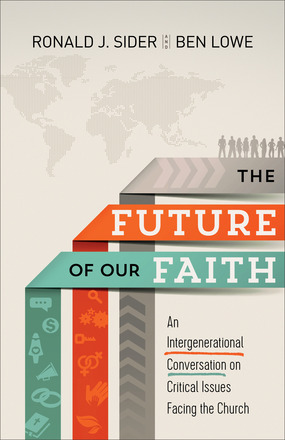 The Future of Our Faith: An Intergenerational Conversation on Critical Issues Facing the Church Ronald J. Sider & Ben Lowe (Brazos) $18.99 What a book! On the heels of #Jubilee2016 this is perfect for me, since the conversations within circle around a huge question for many of us: what is the future of the evangelical movement, in what ways do the rising Christian leaders see things similarly or differently than older church leaders, and what are the burning issues pressing on us now, and looming on the horizon. Sider, as I hope you know, is one of our favorite gentleman and authors; he is impeccable theologically and holds to fairly conventional historic, orthodox doctrine, even if he has a reputation for being a progressive advocate of peace and justice causes. (And even in his robust calls for simple living and creation care and nonviolence and racial justice and such, he is deeply Biblical and theologically sound.) Ron has been a mentor to me from afar and has been a long-standing friend of Hearts & Minds. He is the founder and president emeritus of Evangelicals for Social Action.
The Future of Our Faith: An Intergenerational Conversation on Critical Issues Facing the Church Ronald J. Sider & Ben Lowe (Brazos) $18.99 What a book! On the heels of #Jubilee2016 this is perfect for me, since the conversations within circle around a huge question for many of us: what is the future of the evangelical movement, in what ways do the rising Christian leaders see things similarly or differently than older church leaders, and what are the burning issues pressing on us now, and looming on the horizon. Sider, as I hope you know, is one of our favorite gentleman and authors; he is impeccable theologically and holds to fairly conventional historic, orthodox doctrine, even if he has a reputation for being a progressive advocate of peace and justice causes. (And even in his robust calls for simple living and creation care and nonviolence and racial justice and such, he is deeply Biblical and theologically sound.) Ron has been a mentor to me from afar and has been a long-standing friend of Hearts & Minds. He is the founder and president emeritus of Evangelicals for Social Action.
Ben Lowe is another friend, a younger guy, a Wheaton grad who has published books such as the lively Green Revolution and the very wise Doing Good without Giving Up. He now is the founding spokesperson of Young Evangelicals for Climate Action (and he ran for office a few years back.) Ben was recently orained in the CMA denomination.
So here’s the simple version of the book: the first half is mostly Ron writing about his hopes and concerns for the next generation of Christian leaders. He is candid about his own passion for Biblical principles (he is traditional, by the way, on matters of same-sex marriage and is pro-life; indeed, being consistently pro-life has been a major emphasis of his. He is interested in apologetics and values mature, Biblically-shaped theological study. And pushes us all to live what we believe, not just “talk a good game” as we they say.
At the end of each chapter, Ben replies, offering his own sense of his own generation’s response to Ron’s old ways. Granted, Dr. Sider is no Jerry Falwell or Martin Marty or Marva Dawn or Eugene Peterson, which is to say he isn’t perhaps the most quintessential retirement age church leader, but his concerns certainly represent the concerns of many standard, moderate, thoughtful evangelicals. And Ben isn’t Shane Claiborne or Katelyn Beaty of CT or Gabe Lyon of Q so he doesn’t quite represent all of his generation, either (although he is friends with each of those aforementioned younger evangelicals.) So this conversation seems tilted towards those interested in public faith, in cultural issues, in embodied, whole-life discipleship committed to social change.
So if the first half is Sider offering gray-haired warnings, and young Ben replying, the second half is equally interesting: Ben writes his manifesto and, chapter by chapter, Ron replies.
And, through it all, other voices contribute, too. Christena Cleveland on race and reconciliation, Jenny Yang on immigration, Jim Daly on focusing on the family, Chris Hall (now President of Renovare, the spirituality ministry started by Richard Foster), Nicholas Wolterstorff and others grace these pages, being held up as examples of ways to think well about the many vexing matters picked up and explored together – intergenerationally! – in this fine, fine, and very honest book.
I believe The Future of Our Faith is a spectacularly useful book even if all the voices and views represented were not more or less configured around older/younger demographics. That is the operating vision (Ron and Ben are forty years apart) which brings an extra urgency to it, but I think it is a fabulous and insightful and stimulating book just for creating space to converse well and think together apart from the generational differences. (Of course, I’m an old guy saying that. Ha.) Karen Swallow Prior, herself a young scholar of literature, says it will be “a blessing to the church today and a model for the church to come.” May it be so. Get a bunch and find some older and/or younger friends and read it together. There are great discussion questions included and a lovely reminder at the end about Jesus the Center.
Katelyn Beaty, managing editor of Christianity Today writes,
A wealth of wisdom, conviction, and hope from two leaders who refreshingly defy tired religious and political categories. If you care about the future of Christian witness in a post-Christian American, you’ll read The Future of Our Faith.
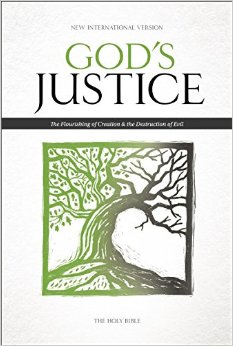 NIV God’s Justice Bible: The Flourishing of Creation & the Destruction of Evil (Zondervan) $39.99 There have been a handful of niche market Bibles that have come out in recent years — The Green Bible in the NRSV has, rather than certain verses in red letters, texts in green, all the passages about creation and creation-care. There is the Poverty and Justice Bible which is designed with craft paper and has sidebars about poverty, naturally. There are men’s and women’s and leadership and Holy Spirit Bibles. We don’t really like most of them very much (although the “green letter” is a pretty neat idea.) We are not so sure that shoe-horning texts into a pre-determined theme or offering sidebars and devotionals that may be fine content, but linked to texts with dubious interpretation, well, it’s just not the best way to read the Bible.
NIV God’s Justice Bible: The Flourishing of Creation & the Destruction of Evil (Zondervan) $39.99 There have been a handful of niche market Bibles that have come out in recent years — The Green Bible in the NRSV has, rather than certain verses in red letters, texts in green, all the passages about creation and creation-care. There is the Poverty and Justice Bible which is designed with craft paper and has sidebars about poverty, naturally. There are men’s and women’s and leadership and Holy Spirit Bibles. We don’t really like most of them very much (although the “green letter” is a pretty neat idea.) We are not so sure that shoe-horning texts into a pre-determined theme or offering sidebars and devotionals that may be fine content, but linked to texts with dubious interpretation, well, it’s just not the best way to read the Bible.
This God’s Justice Bible, though, looks just tremendous. It is made by an international team of 56 global Biblical scholars, which gives it a true study Bible quality — not just super-imposing devotional content here and there. That the “flourishing of creation and the destruction of evil” is a major and appropriate interpretive lens is doubtless, so, again, this could be a major assist in helping people really understand God’s Word.
Even the back cover copy is good. It says,
God’s justice — his plan for ‘setting things right’ — is a foundational principle in the Bible. His plan for justice to triumph is traced from Genesis to Revelation, and as a theme, it forms the backbone of Scripture. God[‘s plan is to restore the flourishing of creation and to see the end of evil, and every book of the Bible is infused with hints of this powerful and redemptive process.
The book introductions are quite good, the study notes look excellent and speak to many contemporary problems (from sexual trafficking to governmental oppression to financial inequality and more.) There are prayers (a nice touch), there are questions for reflection, and there is a full color interior design that has wood-carving images of trees from around the world. (That’s very, very cool.)
We know some of the scholars who offered input in this, and know of others. Our good friend, and former co-director of ESA, Al Tizon (of Filipino descent) did the book of Revelation! Christopher Wright from the UK did Deuteronomy, and many women and men who are scholars who I do not know – from Kenya, Mexico, Taiwan, Argentina, Singapore, India — are represented. Andy Crouch did the notes for Philemon, Ron Sider did Amos, and C. Rene Padilla did 2 Corinthians. Bethany Hanke Hoang, who we just saw at Jubilee? She did the notes for Zechariah. (I wonder if she saw the display we had of this at the Jubilee book display?) What a joy to peruse the insights and Biblical wisdom of these international sisters and brothers!
This weighty, well-made study edition is a good bargain, packed full of helpful study aids. It’s release last week by Biblical and Zondervan is a publishing event. Hooray.
BookNotes
DISCOUNT
ANY ITEM MENTIONED
10% off
order here
takes you to the secure Hearts & Minds order form page
just tell us what you want
inquire here
if you have questions or need more information
just ask us what you want to know
Hearts & Minds 234 East Main Street Dallastown, PA 17313 717-246-3333
